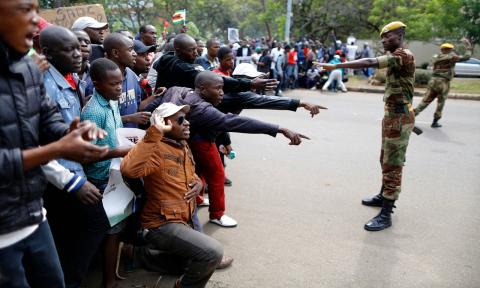
Christian leaders in Zimbabwe have joined together to speak out against the abduction and torture of three women political opposition members.
Three Zimbabwean women political opposition members, including one Member of Parliament, were found on Thursday, May 15 after having gone missing last week following their participation in protests against the growing food shortage in Zimbabwe. The women – Joanna Mamombe, MP, and her colleagues Cecilia Chimbiri and Netsai Marova – are accusing government agents of abduction, torture, and sexual assault. The government is denying involvement in the women’s abduction.
The Zimbabwe Heads of Christian Denominations (ZHOCD), a coalition which includes the Zimbabwean Catholic Bishops Conference, has issued a statement expressing their “shock and disbelief” regarding the news of “yet another abduction and inhumane treatment of three young women, including a Member of Parliament.” The group writes that this horrific act “is against the heart of the Constitution of Zimbabwe, the various International Conventions to which Zimbabwe is a signatory and, above all, to our cultural norms and our Christian fundamental beliefs regarding the sanctity and dignity of life.”
The statement continues, “[It] is deeply disturbing that the country has seen so many cases of abductions and torture in the last few months, most of which have not been conclusively investigated. What is further disturbing are the insinuations, from some State agents, that all these abductions are either stage managed or carried out by an unrecognizable ‘third force’ without substantiating such claims with credible and irrefutable evidence. This constitutes the denigration of responsibility of the highest order on the part of Government.”
The abduction of opposition activists was used as a suppression tactic during the 37-year rule of President Robert Mugabe, who was overthrown in 2017 and died last fall. Zimbabwean opposition activists claim that this tactic continues to be used by the current government.
The ZHDOC coalition called for several next steps to be taken, including an “urgent, independent investigation” into the assault of the women, an “end to undermining the Constitutional rights of Zimbabweans in the guise of COVID-19 intervention,” and for citizens to abide by the regulations of the national lockdown in order to curb the spread of COVID-19. Read the rest of the statement here.
There are concerns that the COVID-19 virus will have a devastating effect on Zimbabwe, a country already under severe political and economic strain. Since a nation-wide lockdown went into effect March 30, a food crisis has taken hold as informal street markets, where millions of Zimbabweans make a living, remain closed. The government is consulting health specialists on how to reopen them safely.
The 2020 edition of the Global Report on Food Crises, released on April 20 by the European Union, FAO, UNICEF, USAID, and World Food Program, anticipates a worsening food insecurity situation in 2020 with an estimated 4.3 million rural Zimbabweans, including children, in need of urgent action. FAO Representative Jocelyn Brown Hall said, “Measures to curb the further spread of COVID-19 have the potential to impact negatively on the food system in Zimbabwe, such as through restricted access to markets by both farmers and consumers, and a glut of perishable nutritious foods like fruits and vegetables. Deliberate measures are needed to prevent and mitigate against these.”
On May 17, President Mnangagwa said the World Health Organization had classified coronavirus transmission in Zimbabwe as "sporadic," with a low number of cases and no discernible clusters. "This may suggest that, despite the small numbers tested, our country might have a reduced COVID-19 trajectory," he said. Doctors and experts have warned that Zimbabwe's poorly equipped health service could not cope with a severe coronavirus outbreak. Since March 30, Zimbabwe has recorded 44 confirmed coronavirus cases and four related deaths.
To help ease its heightened financial challenges due to the shutdown, the Zimbabwean government petitioned international financial institutions, including the International Monetary Fund and the World Bank, for loans even though they should not qualify due to outstanding debt. Prior to the shutdown, the country was already recovering from its worst drought in 40 years and facing an annual inflation rate of 646 percent. As of May 6, the World Bank responded by awarding Zimbabwe a $7 million grant, despite its outstanding debt.
Photo by Flickr/Zimbabwean-eyes.
